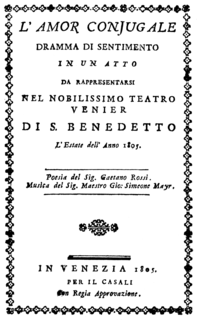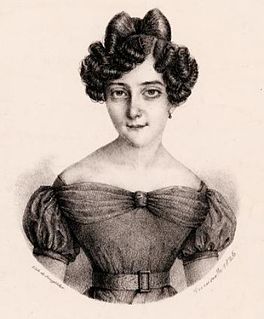Related Research Articles

Il pastor fido is an opera seria in three acts by George Frideric Handel. It was set to a libretto by Giacomo Rossi based on the famed and widely familiar pastoral poem of the 'Il pastor fido' by Giovanni Battista Guarini. It had its first performance on 22 November 1712 at the Queen's Theatre in the Haymarket, London.

Orlando paladino, Hob. 28/11, is an opera in three acts by Joseph Haydn which was first performed at Eszterháza on 6 December 1782. The libretto by Nunziato Porta is based on another libretto, Le pazzie d'Orlando, by Carlo Francesco Badini, itself inspired by Ariosto's epic poem Orlando furioso. The opera was described as a dramma eroicomico and the plot mixes heroic and comic elements. It was Haydn's most popular opera during his lifetime. While in Prague, Mozart conducted a few performances of the opera. The Pennsylvania Opera Theater presented the United States premiere of the work at the Trocadero Theatre, Philadelphia, in March 1982 with John Gilmore in the title role.
Tomaso Benvenuti was a nineteenth-century Italian composer of opera. He was born in Cavarzere in the Veneto and died in Rome at the age of 68.

Giacomo David, was a leading Italian tenor of the late 18th and early 19th centuries.

Angelo Maria Amorevoli was a leading Italian tenor in Baroque opera.

Gioseppa Maria Camilla, commonly known as GiuseppinaGrassini was a noted Italian contralto, and a singing teacher. She was also known for her affairs with Napoleon and the Duke of Wellington. She sang in various productions by composers such as Cimarosa, Cherubini and Zingarelli.

Teresa Saporiti was an Italian operatic soprano and composer most remembered today for creating the role of Donna Anna in Mozart's opera Don Giovanni. She was born in Milan and died there at the age of 106. In her later years, she was often referred to by her married name, Teresa Saporiti-Codecasa.

L'amor coniugale is an opera in one act by Simon Mayr set to an Italian libretto by Gaetano Rossi. It premiered at Padua's Teatro Nuovo on 26 July 1805.
Antonio Palomba (20 December 1705 – 1769) was an Italian opera librettist, poet, harpsichordist, and music educator. He also worked as a notary. Born in Naples, he became a teacher of the harpsichord at the Teatro della Pace in 1749. Most of his more than 50 opera libretti were comedic works written for composers of the Neapolitan school. He also wrote some works for performance in Florence, Bologna and abroad. He died in Naples in 1769; one of the victims of a fever epidemic in the city. Many of his libretti were set more than once to music, and composers continued to use his libretti up into the 1830s.

Vincenzo Calvesi was an Italian operatic tenor and impresario. A skillful lyric tenor, he began his career performing in opera houses in Italy during the 1770s. He was active in Dresden in 1782 to 1783 and then spent most of his time performing in Vienna from 1785 to 1794. He is best remembered today for creating the role of Ferrando in the world premiere of Wolfgang Amadeus Mozart's Così fan tutte in 1790. That same year the Viennese publication Grundsätze zur Theaterkritik described him as "one of the best tenors from Italy…with a voice naturally sweet, pleasant and sonorous." He was later active in Rome as an impresario up until 1811.

La romanziera e l'uomo nero is an 1831 one-act farsa with music by Gaetano Donizetti and an Italian libretto by Domenico Gilardoni, possibly based on the 1819 play La donna dei romanzi by Augusto Bon. Other suggested sources include L'homme noir (1820) by Eugene Scribe and Jean-Henri Dupin and Le coiffeur et le perruquier (1824) by Scribe, Édouard-Joseph-Ennemond Mazères and Charles Nombret Saint-Laurent.
Flammen (Flames) is an opera in two acts and ten scenes composed by Erwin Schulhoff, his only opera. The original libretto in Czech was written by Karel Josef Beneš. The opera had its world premiere at the old National Theatre in Brno on 27 January 1932 in Czech under the title Plameny. It was not heard again until the mid-1990s, when it was performed in its German translation by Max Brod as Flammen. Its story is a surrealist retelling of the Don Juan legend with elements from the legend of the Wandering Jew, and heavily influenced by Freudian psychology. Unlike the title character in Mozart's Don Giovanni based on the same legend, Don Juan is not punished by being dragged down to Hell, but instead is condemned to live forever.

La villanella rapita is an opera giocosa in two acts by Francesco Bianchi. The libretto was by Giovanni Bertati.

Francesc Viñas i Dordal was a Spanish operatic tenor. He is also known by the Spanish version of his name, Francisco Viñas and the Italian version, Francesco Vignas. He was particularly known for his performances in the operas of Richard Wagner and sang in the first production of Parsifal outside Bayreuth.

Caterina Canzi, also known as Katharina Wallbach-Canzi, was an Austrian-born soprano who sang leading roles in the opera houses of Europe, primarily in Italy and Germany. Amongst the roles she created were Isolde in Lindpaintner's Der Vampyr and the title role in Mercadante's Nitocri.
Maria Landini was an Italian soprano who began her career as a singer at the court of Queen Christina in Rome but was primarily active at the imperial court in Vienna from 1711 until her death. She created numerous soprano roles in operas and oratorios by Fux, Caldara, and her second husband, Francesco Bartolomeo Conti and was reputedly the highest paid musician in Vienna at the time.
Gaetano Martinelli was an Italian librettist active in the court theatres of Charles Eugene, Duke of Württemberg from 1766 to 1769 and in Lisbon as the court poet to Joseph I of Portugal and his daughter Maria I from 1769 until his death in 1802. He was one of a group of reforming Italian librettists which also included Calzabigi, Verazi, and Migliavacca, who moved away from the traditional Metastasian plot structures that had dominated opera during the first half of the 18th century. The majority of his early libretti were for comic or semi-comic operas.

Maria Ester Mombelli was an Italian opera singer particularly known for her performances in operas by Rossini and Donizetti. She sang both soprano and mezzo-soprano roles, and often sang with her younger sister Anna.

Eliodoro Bianchi was an Italian operatic tenor and later a prominent singing teacher. Born in Cividate al Piano and trained in Naples under Giacomo Tritto, he made his stage debut in 1793. Amongst the many roles he created during the course of his 40-year career were Baldassare in Ciro in Babilonia and the King of Sweden in Eduardo e Cristina, both of which were composed by Rossini expressly for Bianchi's voice. He retired from the stage in 1835 and spent his later years in Palazzolo sull'Oglio, where he died at the age of 75.

Carolina Crespi, later known as Carolina Crespi-Bianchi and Carolina Bianchi, was an Italian soprano active on the opera stages of Paris and Northern Italy from 1803 to 1820. She was born in Prague, the daughter of the soprano Luigia Prosperi-Crespi (1770–1824). Crespi was married to the tenor Eliodoro Bianchi and appeared with him in three world premieres at La Scala.
References
Notes
- ↑ Though the Amadeus Alamanc refers to the opera as a dramma giocoso.
- ↑ Rice, John A, La Folia in late eighteenth and early nineteenth century Vienna
Sources
- Casaglia, Gherardo (2005). "La pastorella nobile" . L'Almanacco di Gherardo Casaglia (in Italian).
- Rice, John A (1992), "Pastorella nobile, La" in The New Grove Dictionary of Opera , ed. Stanley Sadie (London) ISBN 0-333-73432-7
- Rice, John A, "La Folia" in late eighteenth and early nineteenth century Vienna